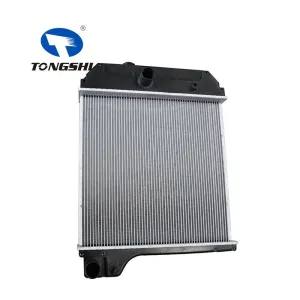The Ultimate Buyer's Guide for Purchasing auto radiators
Purchasing an auto radiator is a crucial decision for vehicle owners, as it directly impacts the engine's cooling efficiency and overall performance. This ultimate buyer's guide aims to provide comprehensive insights into factors to consider when purchasing auto radiators, ensuring informed decisions and optimal outcomes.
Factors to Consider
1. Compatibility
Ensure compatibility with your vehicle's make, model, and engine specifications. Different vehicles require radiators of specific sizes, configurations, and mounting points to fit seamlessly into the cooling system.
2. Material Quality
Choose radiators made from high-quality materials such as aluminum or copper-brass. These materials offer superior heat dissipation and durability compared to traditional materials like plastic or aluminum-plastic composites.
3. Cooling Capacity
Evaluate the radiator's cooling capacity, measured in terms of its ability to dissipate heat efficiently. Look for radiators with larger surface areas, multiple cooling tubes, and high-density fins for enhanced heat transfer and cooling performance.
4. Construction Design
Consider the radiator's construction design, including core thickness, tube layout, and fin density. Opt for designs that maximize airflow and coolant circulation, minimizing the risk of overheating and engine damage.

Parts of a car clutch system and how they function
How do I know if my oil seal is bad?
5 Faulty Radiator Symptoms You Should Know!
How much does it cost to install a radiator?
Are Truck Intercoolers the Key to Efficiency?
Top 5 Ways Radiators Keep Your Car Cool
Understanding the Rad Replacement Cost - A Guide
5. Corrosion Resistance
Prioritize radiators with corrosion-resistant coatings or materials to withstand harsh operating conditions and extend longevity. Corrosion-resistant radiators help prevent leaks, rust, and deterioration, ensuring reliable performance over time.
6. Warranty and Support
Choose radiators backed by comprehensive warranties and reliable customer support. A warranty provides assurance of quality and protection against defects, while responsive customer support ensures timely assistance and resolution of issues.
Significance and Impact
The ultimate buyer's guide for purchasing auto radiators empowers vehicle owners with essential knowledge and considerations to make informed decisions. By prioritizing compatibility, material quality, cooling capacity, construction design, corrosion resistance, and warranty and support, buyers can select radiators that optimize engine cooling performance, durability, and reliability.
Moreover, investing in high-quality auto radiators not only enhances vehicle performance but also contributes to long-term cost savings and maintenance efficiency. Reliable cooling systems help prevent engine overheating, reduce the risk of costly repairs, and prolong the lifespan of vital engine components, ensuring smooth and trouble-free operation.
Furthermore, informed purchasing decisions drive demand for innovative radiator technologies and quality standards, encouraging manufacturers to continuously improve product quality, performance, and reliability. This ultimately benefits consumers by offering a wider range of options and ensuring access to top-tier products that meet their specific needs and preferences.
In conclusion, the ultimate buyer's guide for purchasing custom auto radiators serves as a valuable resource for vehicle owners seeking to optimize cooling system performance, durability, and reliability. By considering key factors such as compatibility, material quality, cooling capacity, construction design, corrosion resistance, and warranty and support, buyers can make informed decisions and maximize the value and longevity of their vehicles.
Everything You Need to Know About Toyota Heavy Industries: FAQs Answered
Is Jeep a GM vehicle? The truth.
Revolutionizing Home Heating: The Future of Radiator Stores?
5 Critical Differences Between Perkins Coolant and Competitors
How long can you drive with a bad radiator?
How Does Radiator Function Impact Car Performance?
Ultimate Guide: Fusion SE L4 1.6L 13-19 - Performance Upgrades & Maintenance Tips









Comments
0